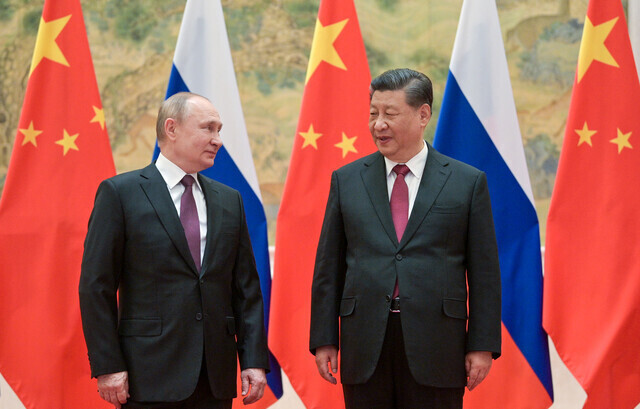hankyoreh
Links to other country sites 다른 나라 사이트 링크
[Column] What China is worried about as it watches the war in Ukraine


By Wang Hsin-Hsien, professor at the Graduate Institute of East Asian Studies at National Chengchi University
The war between Russia and Ukraine is dragging on. Instead of progressing at lightning speed as Russian President Vladimir Putin expected, the war has persisted, bringing to the fore an international power game. Countries of the West have condemned and sanctioned Russia, highlighting the intimate alliance between Beijing and Moscow. Though China is maintaining its attitude of neutrality, the international community is keeping an eye on it in order to make sure the country is not alleviating the effects of Western sanctions by aiding Russia. So what exactly is China’s stance?
First, China has been consistent in regard to its strategic goal of maintaining an all-out strategic partnership with Russia. On Feb. 4, the day the opening ceremony of the Beijing Winter Olympics was held, the two countries released the “Joint Statement of the Russian Federation and the People’s Republic of China on the International Relations Entering a New Era and the Global Sustainable Development” after their leaders met on the same day.
In this document, Chinese President Xi Jinping publicly declared that China “oppose[d] further enlargement of NATO and call[ed] on the North Atlantic Alliance to abandon its ideologized cold war approaches,” aligning himself with Russia’s views. Furthermore, Xi stated that the friendship between Beijing and Moscow “has no limits” and that “there are no ‘forbidden’ areas of cooperation,” making clear that the two countries would respond together to pressure from the US. The statement at the same time significantly reduced China’s strategic arena following Russia’s invasion of Ukraine.
Meanwhile, US-led economic sanctions against Russia strengthened the solidarity within NATO, heightening Europe’s reliance on the US regarding security matters. Simultaneously, the West focusing its attention on Russia gave China — the US’ topmost competitor — some breathing room. This is all the more reason why Beijing supports Moscow’s stance.
China is attempting to secure a moral high ground against the US and take the opportunity to attack the latter. During a press conference last month, Chinese Foreign Minister Wang Yi stressed very clearly that the international community should focus its efforts on two things: bringing about reconciliation and dialogue and preventing a large-scale humanitarian crisis. During a video call with US President Joe Biden on March 18, Xi said that “countries should not come to the point of meeting on the battlefield” and that “conflict and confrontation is not in anyone’s interest.” The intention behind these two statements by Xi and Wang is to paint China as a force proactively advising reconciliation and the US as a force goading on competition.
Public sentiment in China is divided into supporters of Russia and supporters of Ukraine. Supporters of Russia see the country’s invasion of Ukraine as a response to the threat to their safety posed by NATO’s eastward expansion. Moreover, they worry that Russia’s defeat would mean China would have to respond to pressure from and enclosure by the US all on its own and demonstrate to Taiwan that it can resist China.
Supporters of Ukraine come from the premise that war is wrong. Russia has invaded countless countries in its history and specifically occupied various territories of China. Chinese authorities manage public opinion with force. At the beginning of the war, the ratio of Russia supporters to Ukraine supporters was roughly 7 to 3, but now, support for Russia is predominant among Chinese internet users.
Beijing is concerned about three things. First, they’re concerned about the possibility of Russia’s influence weakening to the point that the country cannot function as a strategic buffer between China and the US. If that were to happen, the US would apply more pressure on China, and the strategic competition between the two countries would intensify.
Second, the US is framing the war as a struggle between the force of freedom and the force of authoritarianism. If Russia truly did commit civilian massacres, China would definitively be categorized as belonging to the force of authoritarianism as Russia’s steadfast supporter, which would negatively impact the concept of the “Chinese model” and the “community of common destiny” touted by Beijing in the past few years.
Third, Biden has said that Putin “cannot remain in power,” and though the chances for this scenario are slim, this statement by the US leader may come true, which may in turn become the case in China. This would be an unbearable burden for the Chinese leader to shoulder.
Please direct questions or comments to [english@hani.co.kr]

Editorial・opinion
![[Column] Has Korea, too, crossed the Rubicon on China? [Column] Has Korea, too, crossed the Rubicon on China?](https://flexible.img.hani.co.kr/flexible/normal/500/300/imgdb/original/2024/0419/9317135153409185.jpg) [Column] Has Korea, too, crossed the Rubicon on China?
[Column] Has Korea, too, crossed the Rubicon on China?![[Correspondent’s column] In Japan’s alliance with US, echoes of its past alliances with UK [Correspondent’s column] In Japan’s alliance with US, echoes of its past alliances with UK](https://flexible.img.hani.co.kr/flexible/normal/500/300/imgdb/original/2024/0419/2317135166563519.jpg) [Correspondent’s column] In Japan’s alliance with US, echoes of its past alliances with UK
[Correspondent’s column] In Japan’s alliance with US, echoes of its past alliances with UK- [Editorial] Does Yoon think the Korean public is wrong?
- [Editorial] As it bolsters its alliance with US, Japan must be accountable for past
- [Guest essay] Amending the Constitution is Yoon’s key to leaving office in public’s good graces
- [Editorial] 10 years on, lessons of Sewol tragedy must never be forgotten
- [Column] A death blow to Korea’s prosecutor politics
- [Correspondent’s column] The US and the end of Japanese pacifism
- [Guest essay] How Korea turned its trainee doctors into monsters
- [Guest essay] As someone who helped forge Seoul-Moscow ties, their status today troubles me
Most viewed articles
- 1[Column] The clock is ticking for Korea’s first lady
- 2Samsung barricades office as unionized workers strike for better conditions
- 3[Correspondent’s column] In Japan’s alliance with US, echoes of its past alliances with UK
- 4After 2 months of delayed, denied medical care, Koreans worry worst may be yet to come
- 5[Column] Has Korea, too, crossed the Rubicon on China?
- 6Hong Se-hwa, voice for tolerance whose memoir of exile touched a chord, dies at 76
- 7US overtakes China as Korea’s top export market, prompting trade sanction jitters
- 8All eyes on Xiaomi after it pulls off EV that Apple couldn’t
- 9[Photo] Smile ambassador, you’re on camera
- 10[News analysis] After elections, prosecutorial reform will likely make legislative agenda